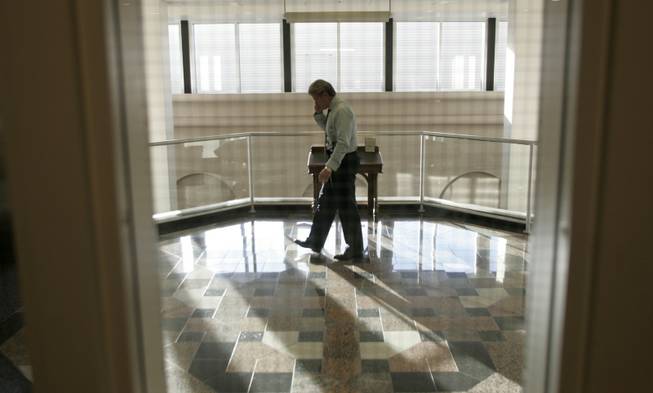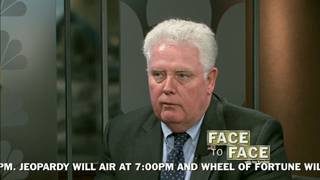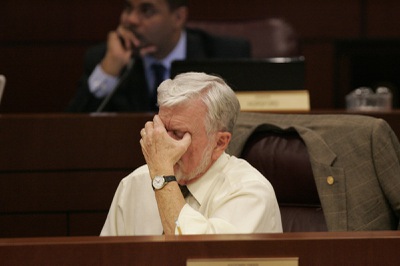
Sen. Randolph Townsend takes a phone call Monday during an Interim Finance Committee meeting before the start of the Legislature’s special session. Democratic and Republican lawmakers met through the weekend and into Monday night to develop ideas to counter the governor’s plan.
Tuesday, Feb. 23, 2010 | 2 a.m.
New Taxes to Balance the Budget?

Viewing video requires the latest version of Adobe's Flash Player
Sun Archives
- Gibbons trims proposed cuts to education (2-22-2010)
- Special session to cost taxpayers $50,000 per day (2-22-2010)
- State budget: Are mining, gaming really ready to pay more? (2-19-2010)
- Politicians face no-win situation as they tackle state budget (2-17-2010)
- Governor’s plan: Layoffs, pay cuts, tax loophole closures (2-16-2010)
- Hundreds attend town hall meeting to weigh in on state budget crisis (2-13-2010)
- Gibbons seems to be backsliding on pledge to not raise taxes (2-13-2010)
- Two Democrats break ranks, call for state tax hikes (2-13-2010)
- Gibbons to sign proclamation Tuesday calling for special session (2-12-2010)
- Crackdown on uninsured drivers weighed to help fill state budget gap (2-11-2010)
- Governor plans emergency address on Nevada budget (2-7-2010)
- Governor’s speech will lay out state’s budget problems (2-7-2010)
- State budget comes up $800 million short (1-22-2010)
- Forecast: Economy will begin to rebound in mid-2011 (1-22-2010)
- Gibbons’ no-talk order further divides branches (1-22-2010)
- Special session may require help of state Supreme Court (1-10-2010)
Sun Coverage
The 26th special session of the Nevada Legislature convenes today with the primary task of closing the state’s $887 million budget deficit.
Most past special sessions have lasted a day or two, with the legislative and executive branches hammering out an agreement ahead of time. As of Monday night, there was no such agreement.
The size of the budget deficit is historic, state government observers say.
Gov. Jim Gibbons has made public his plan to address it with significant cuts to state agencies. Parts of that plan require approval from the Legislature, where the governor has few remaining allies.
Legislators and others have also been floating proposals, which would avoid some of the deepest cuts. Democratic and Republican lawmakers met through the weekend and into Monday night to develop their plan.
A bipartisan agreement is key because lawmakers expect Gibbons to veto some of their proposals. Despite holding majorities in both the Assembly and Senate, Democrats will need Republican support in the Senate to gather the two-thirds necessary to override a veto.
Here’s a cheat sheet on some of the most talked about ideas to close the state’s deficit.
Operating cuts
There appears to be some agreement between Gibbons and lawmakers to reduce operating expenses, including health care for the poor and disabled, prisons, money for school districts and universities.
Gibbons set the target for cuts at 10 percent, saving the state about $380 million. He revised some of those cuts after legislators and the public protested. Gibbons explained the changes by saying federal money has unexpectedly come available.
The reversed cuts include housing for the mentally ill and mentally disabled, dentures for the poor and elderly, and day care for adults with disabilities. With those revisions, the governor’s operational cuts are about $340 million.
Gibbons had also proposed an additional $36 million cut to K-12 education. On Monday, Gibbons’ office announced the cut to education would shrink. Instead of cutting education by 13 percent next fiscal year, the cut would be 10 percent.
Democratic legislators are trying to reduce the cuts to education even further.
InsureNet
Gibbons has proposed an agreement with a Chicago-based company, InsureNet, to set up cameras across the state that would check whether passing vehicles are insured. Although this technology is not operating anywhere in the United States, the company has guaranteed the state $30 million in revenue from fines and additional auto insurance being purchased.
Legislators have been skeptical about the plan, with some worrying about the Big Brother aspect of the cameras and others questioning whether the untested technology will pan out.
Assemblywoman Debbie Smith, D-Sparks, has said the idea requires further discussion, but not during a special session.
Assembly Speaker Barbara Buckley, D-Las Vegas, called it “wacky. I don’t see putting a camera on every corner.”
Four 10s for state workers
Gibbons has proposed changing the workweek for most state employees to four days a week, 10-hour days. Most state offices would be closed Fridays.
There would be exceptions for prison guards, university employees and some others.
The Department of Motor Vehicles, the agency that has the most contact with the public, is looking at operating four or five days a week. Currently, DMV offices are open six days a week.
There would be about $600,000 in energy savings from having buildings closed another day.
Furloughs for state employees would be raised to 10 hours a month from the current eight, saving the state $6.1 million.
Capital accounts
Local governments are sitting on more than $4 billion set aside for capital projects. The Nevada State Education Association, Republican gubernatorial candidate Brian Sandoval and some legislators have advocated taking some of that money to blunt further cuts.
Lynn Warne, president of the teachers union, said that parents would support taking money for repaving parking lots and tracks to save the jobs of teachers. Legislators have said much the same thing.
Gibbons is opposed, saying local governments are experiencing their own problems and shouldn’t be looted to address the deficit. Contracting associations, meanwhile, say that the money is needed to fund public works projects and help a struggling construction industry.
Mining
Gibbons and legislators favor taking more money from mining companies, which is one of the few Nevada industries that is doing well.
Gibbons has called for them to pay the state an extra $50 million by reducing tax deductions mines take before calculating the net proceeds on minerals.
Mining companies oppose this idea. They think that giving legislators a way to effectively adjust the mining tax, which is set in the constitution, would set a dangerous precedent.
That doesn’t mean mining isn’t willing to pay more. The industry has put the number from $50 million to $100 million, through either prepayment of taxes or one-time fees. Democrats and Republicans view the prepayment of taxes as kicking the can down the road, but are interested in raising fees on mining.
Gaming
Legislators have suggested increasing the fees paid by the gaming industry so they cover the cost of operating the state agencies that regulate the industry — the Gaming Control Board and Gaming Commission. This would involve raising the fees paid by gaming companies about $32 million per year.
Sources say the gaming industry is split on the proposal, but some of the largest Strip companies are expected to accept the deal.
The industry is struggling, but there is widespread public support for increasing the amount that gaming pays. Gibbons’ staff said he would support fee increases if it’s supported by the industry that pays.
State parks
Senate Majority Leader Steven Horsford, D-Las Vegas, has talked about closing most or all state parks, saving about $8 million over the biennium.
Environmental and recreation groups have blasted the idea, pointing to the economic benefit from the parks, particularly in rural areas. Many legislators remain skeptical about the idea.
But some legislators think to show the effect of the budget cuts, all aspects of state government need to be affected.
Lease-back state buildings from private companies
Sen. Bill Raggio, R-Reno, is pushing this idea, which he says came from Republican gubernatorial candidate Brian Sandoval.
Nevada could receive $250 million up front from private companies that buy the state buildings. The state would then lease them back.
Raggio and Sandoval say the plan could spare more dramatic cuts without raising taxes.
Gibbons has blasted the idea as impulsive, and bad fiscal policy.
Democratic lawmakers are skeptical, wondering about who would buy the buildings and make money from the plan.
“It seems like we’d be taking out a loan to cover the state’s operating expenses,” Assemblywoman Sheila Leslie, D-Reno, said during a legislative meeting Monday. Republican lawmakers said the purchasers would mostly be institutional investors.
Arizona has sold and leased back its buildings, raising $735 million in the short term, according to media reports.
Sweeping funds
From the Millennium Scholarship to the Dairy Commission, there are pots of money that have been built up for different purposes. Gibbons has proposed “sweeping” that money into the state’s general fund.
There are $89 million in funds paid by industries; another $12.6 million could be taken or diverted from the Millennium Scholarship, which provides scholarships to Nevada students headed to college. Taking that money will shorten how long the program will be around, unless other funding is secured.
Tobacco cessation groups and health care groups have spoken out against taking about $41 million from the state’s tobacco settlement for smoking prevention and health care grants.


Join the Discussion:
Check this out for a full explanation of our conversion to the LiveFyre commenting system and instructions on how to sign up for an account.
Full comments policy